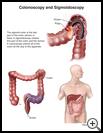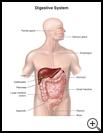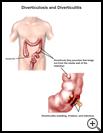
Colonoscopy
What is a colonoscopy?
A colonoscopy is an exam of your large intestine, also called the colon, with a thin, flexible, lighted tube and tiny camera. This scope is put through your rectum and into your large intestine.
A colonoscopy takes 20 to 30 minutes and may be performed in your hospital room or in a procedure room in the hospital. It is usually done for one of the following reasons:
- Prevention and early detection of cancer: A colonoscopy can help your provider find growths (polyps) that might become cancer. The growths can then be removed before they become cancer. It can also help find colon cancer early, when the cancer is easier to cure.
- If you are 50 to 75 years old, your healthcare provider may recommend that you have a colonoscopy at least every 10 years. If you have a personal or family history that increases your risk, your provider may recommend that you start having the test at an earlier age and have the test more often. In some cases, the test may be recommended for people older than 75.
- Diagnosis of illness. If you have symptoms such as diarrhea, rectal bleeding, losing weight without trying to, intestinal problems or belly pain, you may have this test to try to find the cause of your symptoms.
How is a colonoscopy done?
Before the colonoscopy:
- Your healthcare provider will ask you to sign a consent form for colonoscopy. The consent form will state the reason you are having the test, what happens during the test, and what you may expect afterward.
- There is risk with every treatment or procedure. Talk to your healthcare provider for complete information about whether any of these risks apply to you:
- Anesthesia problems
- Infection
- Bleeding
- You will be given instructions for clearing bowel movements from your intestines. Be sure to complete the bowel preparation as instructed, including what types of food and drink you can have in the days leading up to the procedure. The exam may not be done if your intestine still has too much bowel movement in it. Medicines used to prepare for this procedure will cause you to have several watery bowel movements until only clear movements occur. Stay close to the bathroom after you take the medicine. Talk to your pharmacist or healthcare provider about other symptoms you might have.
- Tell your healthcare provider if you have any food, medicine, or other allergies such as latex.
- Tell your healthcare provider if you are taking any medicines, including nonprescription drugs, herbal remedies, or recreational or illegal drugs.
- You may have a small tube (IV catheter) inserted into a vein in your hand or arm. This will allow for medicine to be given into your blood system and to give you fluids.
During the colonoscopy:
- You may be given a sedative through your IV to help you to relax.
- You will be given medicines to prevent pain during your procedure. Local anesthesia numbs the area where you will have the procedure.
- In some cases, you will be given general anesthesia. General anesthesia relaxes your muscles and puts you into a deep sleep. It also keeps you from remembering the operation. While you are asleep, you will have a tube in your throat to help you breath and to make sure you are getting enough oxygen. The tube may be removed before you wake up after the surgery.
- Your blood oxygen level may be monitored by a sensor that is attached to your finger or earlobe.
- A cardiac (heart) monitor may be used to keep track of your heart’s rate and rhythm.
- You will lie on a table on your side with your knees bent and drawn up to your stomach. This position makes it easier for your healthcare provider to pass the scope into your rectum and up into your colon. Your provider can view the images of the colon on a TV monitor.
- As the scope is passed through your colon, a small amount of air is passed into the colon so your provider can see as much of the walls of the colon as possible.
- If your provider sees anything abnormal during the exam, he or she may take small samples of tissue (called a biopsy) through the scope for lab tests. It may be possible to remove any abnormal areas, polyps, or small tumors from the colon through the scope.
After the colonoscopy:
- You may stay in the hospital for a few hours or several days to recover, depending on your condition and your test results.
- While you are in the hospital, you will be checked often by nursing staff.
- It is normal to have gas and mild cramps for a few hours after the exam.
- If polyps or other tissue is removed, you may notice a small amount of blood in your bowel movements for a short time.
What can I do to help?
- You will need to tell your healthcare team if you have new or worsening:
- Diarrhea, constipation, or other intestinal problems
- Bloating or pain in your belly
- Nausea or vomiting
- Tiredness
- Blood or mucus in your bowel movement
Talk with your provider about any questions or concerns you have.
What does the result mean?
This test is only one part of a larger picture that includes your medical history and current health. Your provider will discuss with you any need for treatment based on what is seen during the colonoscopy. In some cases, your provider may be able to treat your condition during the colonoscopy.
If your results are not normal, ask your healthcare provider:
- If you need additional tests
- If or when you need to be tested again
- If you need treatment, and if so what your treatment plan choices are
- If you need to make any lifestyle or dietary changes to keep your colon healthy
Last modified: 2016-03-30
Last reviewed: 2015-10-07



